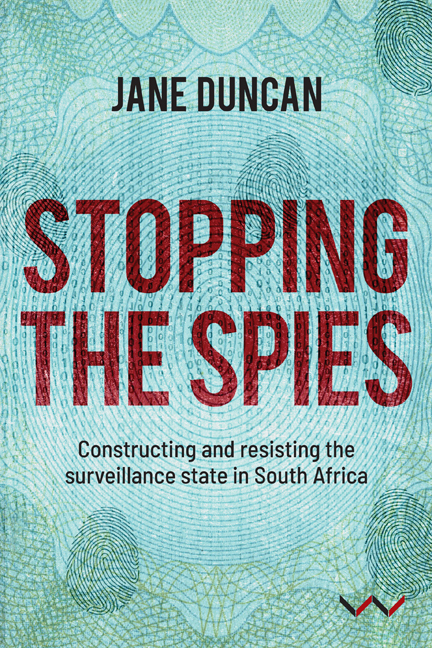Book contents
- Frontmatter
- Contents
- Acknowledgements
- List of Figures and Tables
- List of Acronyms
- Preface
- Introduction
- Chapter 1 Theorising the surveillance state
- Chapter 2 Is privacy dead? Resistance to surveillance after the Snowden disclosures
- Chapter 3 The context of surveillance and social control in South Africa
- Chapter 4 Lawful interception in South Africa
- Chapter 5 State mass surveillance, tactical surveillance and hacking in South Africa
- Chapter 6 Privacy, surveillance and public spaces in South Africa
- Chapter 7 Privacy, surveillance and population management: the turn to biometrics
- Chapter 8 Stopping the spies: resisting unaccountable surveillance in South Africa
- Chapter 9 Conclusion
- Notes
- Select Bibliography
- Index
Introduction
Published online by Cambridge University Press: 17 May 2019
- Frontmatter
- Contents
- Acknowledgements
- List of Figures and Tables
- List of Acronyms
- Preface
- Introduction
- Chapter 1 Theorising the surveillance state
- Chapter 2 Is privacy dead? Resistance to surveillance after the Snowden disclosures
- Chapter 3 The context of surveillance and social control in South Africa
- Chapter 4 Lawful interception in South Africa
- Chapter 5 State mass surveillance, tactical surveillance and hacking in South Africa
- Chapter 6 Privacy, surveillance and public spaces in South Africa
- Chapter 7 Privacy, surveillance and population management: the turn to biometrics
- Chapter 8 Stopping the spies: resisting unaccountable surveillance in South Africa
- Chapter 9 Conclusion
- Notes
- Select Bibliography
- Index
Summary
‘I saw my final hour unfurl before me, I thought this was the end. I thought I'm finished, I'm finished. I was terrified. We must all have thought the same.’ Julian Pierce, a journalist for the French radio network Europe 1, was inside the Bataclan theatre in Paris in November 2015, watching a live music show, when gunmen claiming to support the Islamic State for Iraq and Syria (ISIS) stormed the theatre and shot indiscriminately into the crowd. Eighty-nine people died in that attack, and a further 41 people were killed in other co-ordinated attacks around the city that night. It must be many people's worst nightmare: becoming a victim of a terrorist attack simply for being in the wrong place at the wrong time.
Terrorist attacks have swept Europe in the past few years, with France being attacked repeatedly. I will discuss the politics of naming particular acts as ‘terrorist’ later in the book; for the moment, suffice it to say that I do recognise forms of violent political action that could be legitimately considered terrorist. Fearful citizens have looked to their governments to protect them from terrorist violence, and these governments have responded by increasing their intelligence and policing powers. In fact, intelligence work has become increasingly important to governments seeking to thwart terrorist threats, as it allows them to identify the culprits of these attacks and even prevent future attacks from taking place. They can also profile possible ‘persons of interest’, who might become terrorists in future. Gathering intelligence from human sources (or human intelligence, as it is known in the intelligence community) is expensive, time-consuming and often dangerous, as terrorist organisations could uncover spies in their midst, or these spies may provide unreliable information, or even be recruited as double agents. Given the drawbacks of human intelligence, more governments are turning to the surveillance of communications networks to acquire intelligence on terrorist activities and plans (what is called signals intelligence).
Yet, government surveillance programmes may not be motivated purely by the noble objective of protecting public safety. We have all become familiar with terms that describe a government that spies indiscriminately on its people in order to maintain its grip on power.
Information
- Type
- Chapter
- Information
- Stopping the SpiesConstructing and resisting the surveillance state in South Africa, pp. 1 - 20Publisher: Wits University PressPrint publication year: 2018
